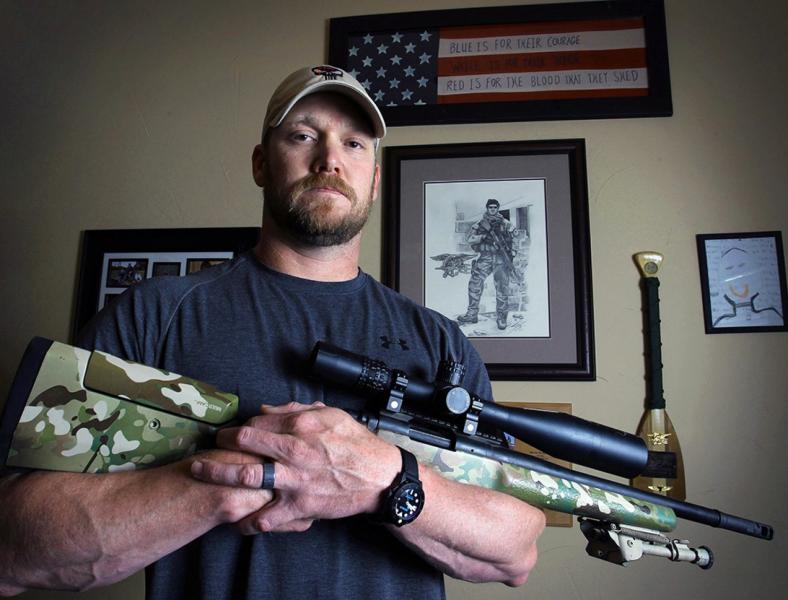Why Do Americans Love War Movies?

The soldier in the entertainment spotlight as of late is Chris Kyle, the American Sniper himself. The film depicting his exploits is on its way to become the highest-grossing R-rated film of all time. The film has already landed countless nominations and awards proving itself to become both a commercially successful AND critically acclaimed which seems rare in modern cinema.
READ MORE: 25 Movies To See Before The Oscar
The film follows the life of US Navy SEAL Chris Kyle who, during his four tours in the most recent Iraq War, proves himself as the most deadly sniper the US military has ever had in its employ.
The movie, which is based on the autobiographical novel authored by Kyle himself, includes the struggles of his home life between tours and his adjustment to its serene, nonthreatening environment.
Without giving too much away for those who have not yet seen the film, the movie develops an underlying theme of patriotism which becomes intermittently disturbed by a motif of mental illness.
Reactions to this film have been varied, ranging from cynicism to intense patriotism. A recent passive-aggressive celebrity feud ensued from the differing responses of Michael Moore, Seth Rogen and Blake Shelton to the content of the film.
READ MORE: Best Celeb Social Media Posts Of The Week
What is it about films depicting war that create both hype AND contention through the nation?
Americans’ views on war has never been clear-cut. War film history reflects this notion as well.
There have been films oozing with patriotic propaganda such as "Saving Private Ryan," "Top Gun" and "Red Dawn." Films taking a cynical approach to war such as "Dr. Strangelove" and "Full Metal Jacket."
However, many modern war films seem to take an impartial stance on their view of American involvement in war, but involve themselves in the specific experiences of soldiers. These are films such as "Black Hawk Down," "The Hurt Locker," "Lone Survivor," "Jarhead" etc.
There seems to be a formula in creating these "objective modern war movies." The story is centered in on a singular soldier or several members of his team. They develop each character and build (sometimes hesitant) relationships between the soldiers. Meanwhile, back at home there is a young female significant other waiting for the protagonist's safe return home. The team of soldiers goes out on a seemingly uneventful mission, then they become surrounded and cut off from others in a brutal attack. A thrilling gun fight ensues and some American soldiers are wounded or killed. In the end, a couple soldiers maybe survive and live on to tell the tale.
In addition to this blueprint, filmmakers create the harsh aesthetic of the Middle East by use of intense weather conditions, signs of poverty with a desert backdrop. Occupying this land usually is a community of religious extremists who don turbans and a formidable scowl.
READ MORE: Painting With A Broad Brush: American Rhetoric Alienates Muslims The World Over
With such a predictable outcome, why is it that these films top the charts with almost every release?
It could be linked to the historical context in which each film is presented. The beginning of this era started with "Black Hawk Down" which was released Dec. 2001, only 2 months after the tragedy of 9/11.
This time known as “post-9/11” greatly affected the media and the beliefs of the American people. Patriotism had reawakened from decades before and the Iraq War was not seen as a possibility, but a necessity.
Therefore, post-9/11 films must provoke the same feelings as the whole of the American populace. Thus, American filmmakers took this opportunity to sell back the American sentiment of war back to them.
However, the trend of the post-9/11 war movie continued on through recent years when the wars in the Middle East have been more unpopular than ever.
With the example of "American Sniper" with the other post-9/11 war films, the personal, “based on a true story” story it seems as though the propaganda is not for the preservation of America, but the preservation of safety for individual Americans.
Modern filmmakers cleverly set up the characters in a battle situation to provoke emotion, camaraderie and pathos regarding the protagonists.
READ MORE: A Briefing On 'Big Eyes': Get Ready For Tim Burton's New Biopic
Unknowingly or knowingly, these film producers, writers and directors are creating a sympathetic pro-war film in an mostly anti-war United States. Whether it's fueled by the American government or whether the producers are simply creating stories that will sell, these films are secretly undermining the liberal media.
Though the audience focuses on the emotional build-up and tear-down of the protagonist(s), they are subconsciously rationalizing war by acknowledging it as a crime against (American) humanity.
On the other hand, there seems to be no indication of the fact that all acts of war are crimes of all humanity. This regard for peace is completely pushed aside when the celebrity protagonist faces their death.
While it is important to present these tragic and sometimes disturbingly real accounts of modern warfare, one must proceed with caution and a rational mindset.
As an audience member, one must ask themselves during "American Sniper" or any other post-9/11 war film, “Am I paying attention to the underlying cause of war (property, greed, terrorism, religion, etc.) or am I simply reacting to the personal saga?
Reach Staff Reporter Julia Imperatore here.



